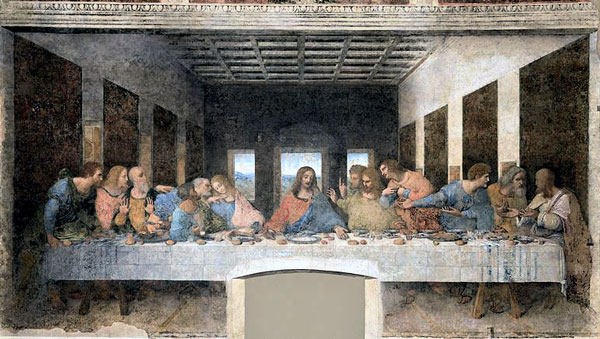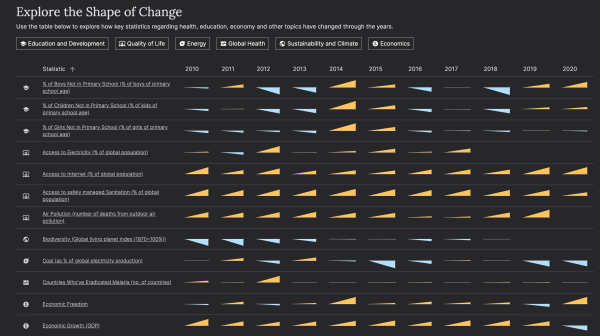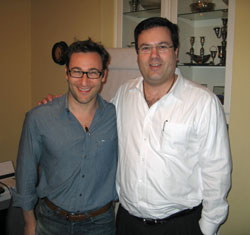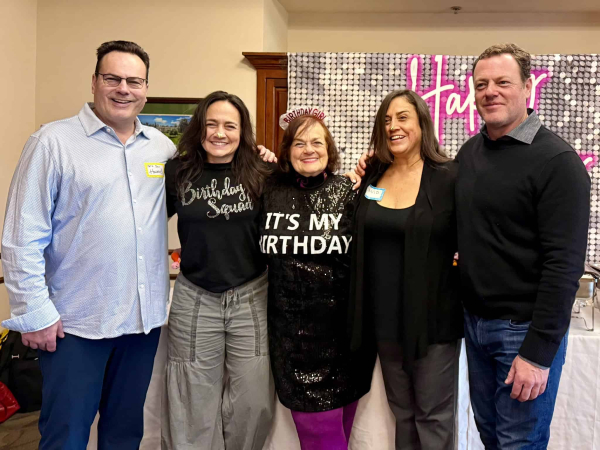
Here are some of the posts that caught my eye recently. Hope you find something interesting.
Lighter Links:
Trading Links:

Here are some of the posts that caught my eye recently. Hope you find something interesting.
Lighter Links:
Trading Links:
Last week, Astronomers announced the discovery of the most promising "hints" of life on an exoplanet, K2-18, 124 light years away.
While it would only be signs of phytoplankton and other microscopic marine life, it would still be a massive finding.
I tend to read a lot across a wide variety of sources. Recently, I've noticed a significant uptick in stories about aliens, UFOs, non-human intelligence, and non-human technology. In addition, several of my seemingly sane friends claim to have direct knowledge of projects and groups (funded by well-known billionaires) close to making very public announcements about missions, research, and discoveries in these areas, they hope will result in discontiguous innovations and asymmetric capabilities.

While I believe it's naive to assume that there's no other form of life in a universe as vast as what we understand … I'm also highly skeptical of anyone who claims that they have specific knowledge or proof. With that said, I have seen enough stuff from people I trust to expect that our beliefs about these issues will shift massively in the very near future. As an example, check out Skywatch.ai, some of its videos, or this NewsNation broadcast.
Since we live in a time where technologies are rapidly advancing, I thought it might be interesting to test out an AI-powered chatbot designed to debunk conspiracy theories through evidence-based conversations. It is a spin-out project with roots at MIT and other top universities. Research shows that many people doubted or abandoned false beliefs after a short conversation with the DebunkBot.
I first heard of this tool through these two articles: Meet DebunkBot, The AI Chatbot that Will Debunk Any Conspiracies You Believe and AI Chatbot Shows Promise in Talking People Out of Conspiracy Theories.
Here is a link to the conversation I had with it about the belief "Life likely exists elsewhere in the Universe due to its vastness and the repeated conditions that can give rise to life." To my surprise, this tool concluded that the belief is not a conspiracy theory and reminded me that:
Science for the sake of knowing is one thing. Belief for the sake of hope, curiosity, or imagination is another. The search for "life" might actually help us discover something more valuable than what we thought we were searching for in the first place.
You can test your beliefs against DebunkBot's AI. Let me know how it goes and whether you changed your mind.
Meanwhile, Information Is Beautiful has an interactive data visualization to help you decide if we're alone in the Universe.
As usual, it's well done, fun, and informative.
For the slightly geeky amongst us, the model lets you adjust the estimate by playing with the Drake and Seager equations.
The Drake equation estimates the number of detectable extraterrestrial civilizations in our galaxy and the universe. It factors in variables such as habitable planets, the likelihood of life, intelligent life, and the duration of time a civilization sends signals into space.
The Seager equation is a modern take on the equation, focusing on bio-signatures of life that we can currently detect – for example, the number of observable stars/planets, the % have life, and the % chance of detectable bio-signature gas.
Click here to play with the Are We Alone in the Universe infographic.
For both equations, the infographic lets you look at various default options, but also enables you to change the variables based on your beliefs.
For example, the skeptic's default answer for Drake's equation shows 0.0000062 communicating civilizations in our galaxy, which is still 924,000 in the universe. The equivalent for Seager's equation shows 0.0009000 planets with detectable life in our "galactic neighborhood" and 135,000,000 planets in our universe.
Even with the "lowest possible" selection chosen, Drake's equation still shows 42 communicating civilizations (Douglas Adams, anyone?) in the universe.
One of the most interesting numbers (and potentially influential numbers for me) is the length of time a civilization sends signals into space. Conservative estimates are 420 years, but optimistic estimates are 10,000 or more.
One other thing to consider is that some scientists believe that life is most likely to grow on planets with very high gravity, which would also make escaping their atmosphere for space travel nigh impossible.
If any aliens are reading this … don't worry, I won't tell. But we will find out who you voted for in the last election.
Next Sunday is Easter, but yesterday was the first night of Passover – an 8-day long Jewish holiday that recounts the story of Exodus.
The overlap can be seen in DaVinci's Last Supper, depicting a Passover Seder and Jesus's last meal before his crucifixion.

Part of the Passover Seder tradition involves discussing how to share the story in ways that connect with different types of people, recognizing that everyone understands and relates to things differently.
To do this, we examine the Passover story through the lens of four archetypal children — the Wise Child, the Wicked Child, the Simple Child, and the Child Who Does Not Know How to Ask.
The four children reflect different learning styles — intellectual (Wise), skeptical (Wicked), curious (Simple), and passive (Silent) — and highlight how we must adapt communication to the diverse personalities and developmental stages of our audience.
This seems even more relevant today, as we struggle to come to a consensus on what to believe and how to communicate with people who think differently.

On a lighter note, one of the memorable phrases from Exodus is when Moses says, "Let my people go!" For generations, people assumed he was talking to the Pharoah about his people's freedom. But after a week of eating clogging food like matzoh, matzoh balls, and even fried matzoh … for many Jews, "Let my people go" takes on a different meaning.
After Passover, and as we enter a new season, it's a great time for a mental and physical 'Spring Cleaning,' and delve into your experiences to cultivate more of what you desire and less of what you don't.
Here is to Spring, Re-Birth, and Spring Cleaning.
Hope you had a great weekend.
Change is the only constant in life, yet it rarely unfolds in ways we expect. While we sense its approach, its shape — whether sudden and disruptive or slow and subtle — often defies our predictions. As the pace and scale of change accelerate, understanding its patterns becomes more crucial than ever.
The World Government Summit put together a helpful interactive website where you can test your knowledge on the trajectory of key statistical indicators for the development of society over the past decade. Here is the text from their opening screen.
Can we estimate how much the world has changed in a decade? Or do our own experiences impact the perception of progress? This work challenges the assumptions we make about how key statistical indicators regarding Health, the Environment, or Education evolve through the years.
- The Shape of Change via the World Government Summit
The first part of the process was designed to be like a guessing game where you try to predict the direction and the rate of change of key issues shaping the world (like oil dependency, pollution, literacy, economic freedom, etc.) by answering some questions at "The Shape of Change." It is simple, easy-to-use, and has a nice interface … but answering the questions was more challenging than expected. Try it here.
The Shape of Change via the World Government
The second part of the experiment lets you explore the year-over-year changes in key statistics regarding health, education, economy, and other topics.

The Shape of Change via the World Government
If you want to explore this further, I asked Perplexity to give me a broad overview of the project and its key insights. Here is the link.
The data is interesting. But, perhaps, your reaction to the data is more important.
Were there any numbers that surprised you?
|
Ideas don’t have to be complex to be valuable. Twice this week, I heard someone say, “Start with Why.” As a tech entrepreneur, I often ignore that aphorism. Someone who embodies it (and made it famous) is Simon Sinek. He is a motivational speaker and organizational consultant who gained widespread recognition after his 2009 TED Talk, “How Great Leaders Inspire Action,” which remains one of the most-viewed TED Talks ever, with almost 70 million views. This talk introduced his core framework: The Golden Circle, the concept that catapulted him to fame. It is a simple but powerful model for understanding why some leaders and organizations inspire while others don’t. It consists of three concentric circles, like a bullseye. At the center is Why, the middle ring is How, and the outermost ring is What. |
|
|
|
Most people and organizations focus on the outermost circle first—what they do—and then work inward. Sinek flips this approach, arguing that great leaders and companies start from the inside out: start with Why. Why Start with Why? Here’s an analogy: Think of a magnet. The strongest force comes from its core. Similarly, in leadership and business, the Why is your core—it’s what attracts people to you. It’s not just about selling a product; it’s about sharing a belief or vision that resonates emotionally with others. For example:
The Biological Connection Sinek ties this idea to how our brains work. The outer layer of the brain (the neocortex) processes logical information like facts and figures (What), but decisions are driven by the limbic brain, which controls emotions and instincts (Why). When you lead with Why, you speak directly to people’s feelings, inspiring trust and loyalty. Simplified Takeaway Think of it like this: If you want people to join your cause or buy into your vision, don’t just tell them what you’re selling or how great it is. Tell them why it matters—to you and to them. Starting with Why connects hearts before minds, creating a lasting impact. In short, the Golden Circle isn’t just a business strategy; it’s a way to inspire action by leading with purpose. I met Simon through friends before his first book came out. Then, in 2009, he gave a speech to the Dallas Chapter of EO, and then visited my office to speak with our team afterwards. I still remember how well-received he was. It was right at the beginning of his meteoric rise, two short months after the release of his famous book "Start With Why." Here's the article I wrote in 2009 after that visit: |
___________________

Inspiration is stronger than persuasion. It gives people a sense of purpose and belonging that has little to do with external incentives or benefits.
Simon Sinek, who is quite charismatic and well-spoken, is delivering this message to a rapidly growing fan base.
My team thought Simon was inspiring, engaging, and insightful.
You can watch a short video that introduces his material below.
In addition, you can explore more of his ideas in his book, Start with Why: How Great Leaders Inspire Everyone to Take Action.
An Example of Finding the Right Person for a Job.
Who do you believe will do a better job, someone who takes a job because of the salary and benefits … or someone truly inspired to accomplish the job's purpose?
Phrased that way, of course, you know the answer. Still, how can you leverage this to better select customers and employees?
For example, Simon uses the story of Sir Ernest Shackleton to illustrate this concept. Shackleton was preparing to lead the first expedition across Antarctica in 1914. Legend has it that when seeking crew members for his journey, Shackleton placed the following ad in a newspaper:
"MEN WANTED FOR HAZARDOUS JOURNEY. SMALL WAGES, BITTER COLD, LONG MONTHS OF COMPLETE DARKNESS, CONSTANT DANGER, SAFE RETURN DOUBTFUL. HONOUR AND RECOGNITION IN CASE OF SUCCESS.
- SIR ERNEST SHACKLETON"
When the expedition became stuck in the ice and could not be rescued for 22 months, not a single man was lost. The reason Simon gave for their unlikely survival was that Shackleton hired survivors that could deal with the situation and were aligned with the mission and purpose.
Can you imagine writing an ad like that to attract the right people to your cause?
Watch This Video.
Here is a video of Simon speaking at a TED Conference. It is an excellent intro to his stuff.
Other Resources:
_____________________
It's now more than ten years later, and Simon is one of the most prominent leaders in leadership development and has published five books, to much acclaim.
Part of his success is the charisma and pith with which Simon speaks and writes – but a large part is his focus on what makes humans human. He's not preaching a leadership mantra focused on the bottom line and revenue; he's focused on the aspects of human nature that don't change. He's focused on purpose and the elements of leadership that apply to everyone – not just CEOs.
As we move into an era of increased volatility – both in markets and business – these leadership principles will become more important.
Understanding your "WHY" is vital if you want to make a difference (and not be replaced by an AI). It’s also vital in making discipline the easier choice.
If you haven't read any of his books, they're all good, but I suggest "Start With Why" and "The Infinite Game."
Many of our best decisions, timeliest course corrections, or significant innovations occur after a seemingly disastrous occurrence. That's why many psychologists and self-help gurus encourage people to focus on the hidden gift that many of these experiences provide.
It's there if you look for it. That painful event becomes the catalyst for either something new, a better way, or a level-up.
The goal isn't just to survive – it's to thrive. While a robust business can withstand shocks and a resilient business can recover from them, an anti-fragile business improves and grows stronger when exposed to volatility, randomness, disorder, and stressors. The interesting thing about this concept is that it doesn't mean not fragile. It means things that weaken other systems are actually the things that strengthen you.
Of course, that's not the case for everyone or every event … It takes the right mindset and the right actions to turn a trial into a triumph.
As we see the world changing rapidly, both through AI and through Trump's presidency, I think back to 2008 and how a prior incarnation of algorithms fared against it (spoiler alert: not nearly as well as this time). They say the things that don't kill you make you stronger. Here's my trial into triumph story about that.
Via Howard Getson's YouTube Channel.
Too many people become victims of their circumstances instead of choosing to be the master of their destinies.
Life is harder for people who live a life of least resistance. Doing the hard things and making the most of bad times makes life better and, ultimately, easier.
Tony Robbins calls this the Threshold of Control. If you push through the fear and the struggle … as you persevere, eventually, what was scary becomes easy. You've increased your threshold, and that's often a permanent improvement.
Here is a list of the seven steps I use to transform almost any situation.
Seven Best Practices for Uncertain Times.
They say everything happens for a reason. The secret is that you get to choose the reason, what it means to you, and what you're going to do about it. Choose well, and someday, you could look back on this time as one of the best things that ever happened to you.
We live in exciting times!
No, I'm not talking about how fast the DOGE team is terraforming government.
I'm talking about how fast the insights of exponential technologies are compounding the real-world implications of where we are and where we are going.
In past issues, we've talked about how quickly the world is changing, how fast innovations happen, and why it's not about today's tools but rather the value and capabilities of the foundational assets we build upon … and, ultimately, the things that makes possible.
Today's commentary is different from our usual posts. Yes, the inspiration came from my weekly curation of links selected based on what captured my attention or imagination. However, today's post is about the sheer volume and density of groundbreaking innovations competing for mindshare and investment dollars. And while commercial success is a great way to keep score, we'll explore what this accelerating pace of innovation means for our future and the world.

So, here is a list of some of the things that made headlines this week.
Some may not matter to you now. Try re-reading the list while letting yourself be amazed at what is happening!
Any one of these is a momentous achievement that would have sounded like science fiction even 10 years ago. Now, that's one week of achievement.
As someone whose company invents things for a living, I understand that none of these breakthroughs were actually invented last week. Obviously, a long and winding road leads to each of those announcements. However, it's remarkable to see so many significant innovations reaching the stage of public announcement simultaneously.
It's hard to quantify the impact of these innovations on not only the tech industry – but the world.
Think about the implications. Google's co-scientist is already solving problems that humans haven't been able to solve for decades. Clone is building robots that will use the next generations of AI to transform how we think about what artificial intelligence looks like.
Not to mention the improvement in quantum computing and nuclear fusion, industries that I've been paying attention to since the 90s.
While any of these topics would have made a good article, in my opinion, the whole is more impressive than the sum of its parts.
If I had to pick one of those topics to highlight, I think it's now time to start focusing more on quantum computing.
To start, here's an hour-long interview with Satya Nadella about Microsoft's new quantum chip – and what it means for AI & business.
via Dwarkesh Patel
Most of you probably aren't interested in watching the whole thing, but here are some of the highlights.
Prepare for things to get more interesting.
We do live in exciting times!

Here are some of the posts that caught my eye recently. Hope you find something interesting.
Yesterday was my Mother's 85th birthday.
Her children surprised her with over 60 family and friends at dinner last night. Here is a photo of us with her at the party.

My mom is quite the woman. She went to Cornell, taught Spanish Literature at Temple University, and has volunteered for countless good causes. At 40, as her kids became more self-sufficient, she decided to go to law school and become a lawyer to help those who needed it most. That doesn't even begin to capture it! For example, she still serves as a museum docent and is an active member of many clubs and organizations. In addition, after my Dad died, she chose to serve as a hospice counselor to help families going through that difficult time. After doing that for a while, she decided that she wanted to continue – but in a more positive way. So, to help make things better and easier to bear, she became a clown to bring light to people struggling. That is not a sentence I imagined writing a few years ago.
My mom also loves poems, wordplay, and puzzles.
As part of her celebration, we had everyone (OK, almost everyone) write poems for her.
I did not write a poem (though I did write something) … and I also chose not to use ChatGPT (or any other large language model) to help with what I wrote.
I feel like I should explain that. What I did write, came from the heart.
If my goal had simply been to come up with a poem, I would have used ChatGPT or one of its competitors. The truth is, many people at the event did exactly that, and I was surprised at the quality of their output.
With that said, there's something meaningful about the process of thinking deeply about something (in this case, my Mother) and choosing which things to highlight (or set aside), what to poke fun at, and which things to express gratitude for. The act of thinking and writing is valuable … separate and apart from the output generated.
The same is true for your life as well. Being and Doing are both important.
Your identity and strategies combine to create the life you are living. Said a different way, the things you choose to focus on (and what you make them mean) shape your perspective and guide your actions.
That is also why it's vitally important to consciously create a compelling future that calls you forward (and keep score by tracking your progress in ways that resonate with your values).
Here is a small excerpt from my love note to my Mother.
The Golden rule says “Do unto others as you would have them do unto you.” But sometimes, it’s important to remember to be as kind to yourself as you are to others.
As I think about you and what I wish for you, Mom, it’s that you’re as kind and understanding to yourself as you’ve been to those around you.
It’s important to recognize the progress you’ve made with the good you’ve done, rather than what could have or should have happened – or how many things you still feel the need to do.
I think one of the most useful definitions of “intelligence” is that it is the ability to get more of what you want – and for you, Mom, I think that is a sense of happiness, contentment, and purpose. In your words – a Happy Heart.
Happy Birthday, Mom … and many more!
I suspect we all know the power of purpose. With a big enough WHY, the HOWs don't seem to matter.
The average age at this party was probably 80 – and at least one of them was 100! Think how important it is for them to have a sense of purpose and accomplishment!!
But if it is important for them … it is probably more important to you because of something I call The Time Value of Life (which we'll discuss next week).
Carl Sagan was an astronomer and planetary scientist whose most enduring legacy lies in his extraordinary ability to communicate complex ideas to the general public.
Shortly before his death, he participated in an oddly prescient interview about short-form media and public attention. It is worth clicking to hear his clear thoughts about how governments will use ignorance of science and technology to control people.
via YouTube
He goes into more detail about this topic in his book, The Demon-Haunted World: Science as a Candle in the Dark."